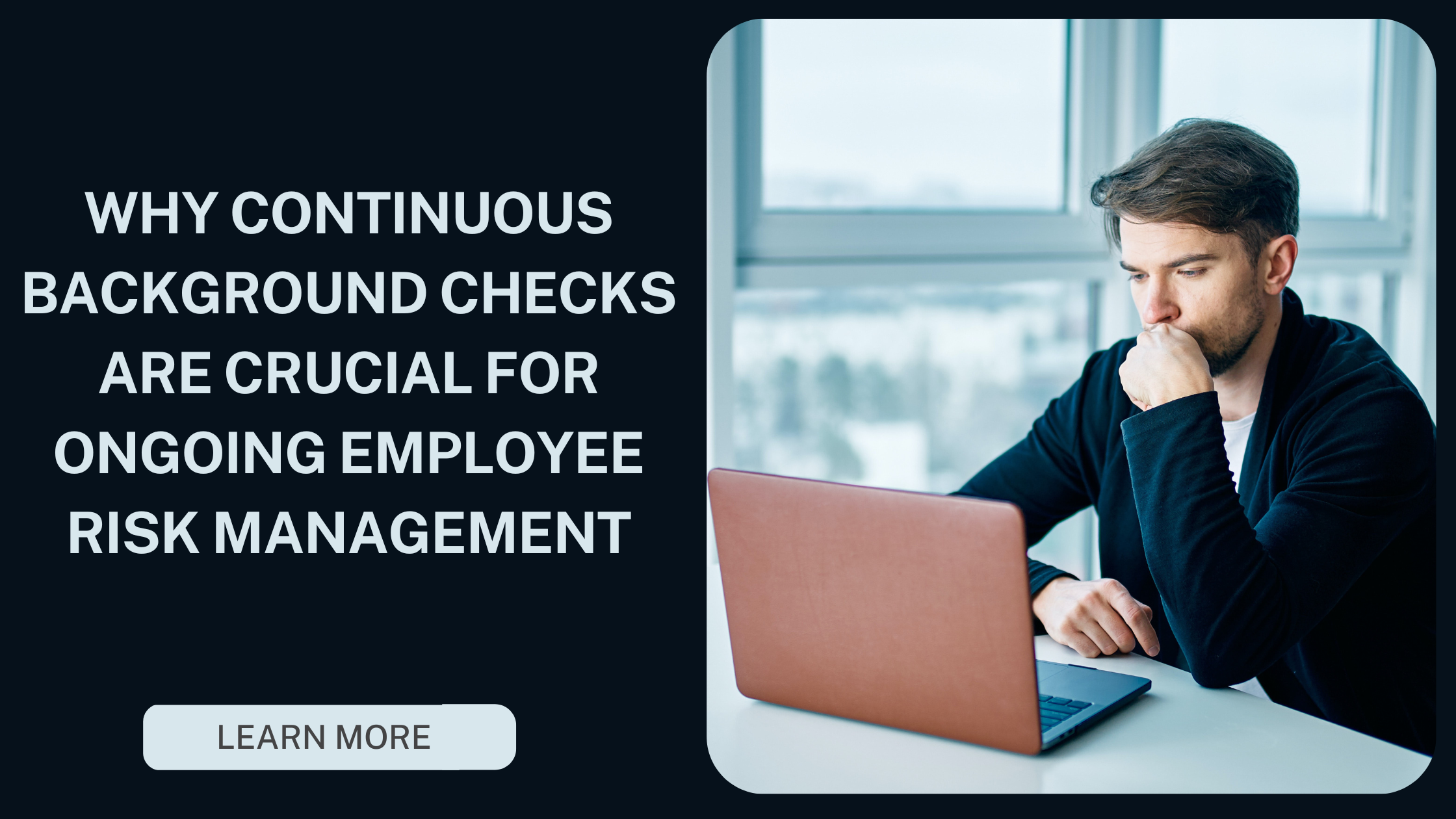The Basics of Continuous Background Checks and the Importance of Ongoing Monitoring
Continuous background checks have become an essential tool for businesses looking to manage ongoing employee risk and protect their assets, reputation, and workplace environment. Unlike traditional background checks conducted during the hiring process, continuous monitoring ensures that companies stay informed about any changes that may pose risks after the employee has joined the organization. In this section, we’ll explore the different types of background checks commonly used in pre-employment screenings, the role of continuous background checks, and why it’s vital to monitor employees regularly to detect any emerging issues.
What Are Continuous Background Checks?
Continuous background checks, also known as ongoing employee monitoring, are designed to track an employee’s background throughout their employment. These checks are typically automated and provide employers with real-time updates regarding changes in an employee’s background that could affect their suitability for their role. Examples of issues flagged by continuous monitoring include criminal offenses, financial issues (such as bankruptcies or unpaid debts), changes in driving records, or other potential concerns.
Why Are Continuous Background Checks Important for Employee Risk Management?
The need for ongoing monitoring becomes apparent when considering that an employee’s circumstances may change at any time during their tenure with an organization. For instance, an employee who was hired based on a clean criminal record could become involved in criminal activity after they are hired. Similarly, an employee who was financially responsible when hired may face financial difficulties that lead to reckless behavior. Continuous background checks help employers stay informed about their employees’ evolving situations, ensuring they can take swift action if an issue arises that could pose a risk to the organization or its reputation.
Benefits of Continuous Background Checks
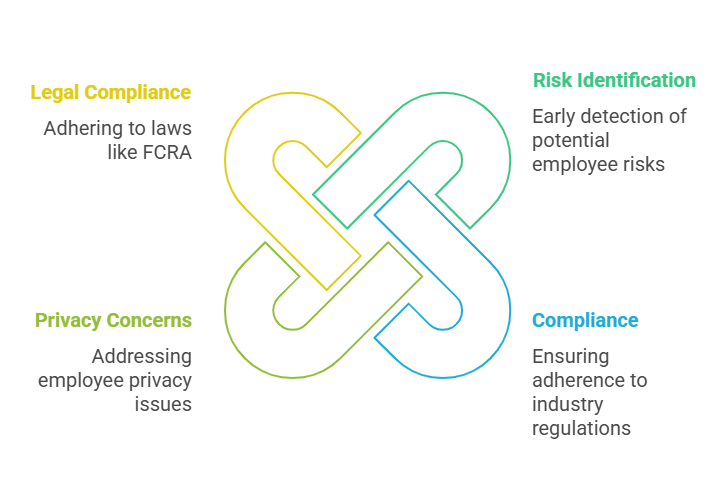
The most significant benefit of continuous monitoring is the ability to catch potential problems before they escalate. Regular updates help employers to identify risks early, which can be critical for preventing workplace incidents, protecting company assets, and maintaining a safe work environment. For example, employees with driving-related jobs may pose a risk if their driving record deteriorates during employment. Continuous checks allow businesses to detect these changes and take appropriate action.
Additionally, continuous background checks ensure compliance with industry regulations that may require ongoing monitoring, such as those in healthcare, finance, or transportation sectors. This can protect the organization from legal liabilities related to negligent hiring or failure to monitor employee conduct.
However, while continuous background checks provide significant benefits, they also come with some challenges. Employers need to be mindful of privacy concerns and legal compliance when conducting these checks. It’s essential to ensure that the checks are conducted in a way that adheres to federal and state laws, including the Fair Credit Reporting Act (FCRA).
Pros and Cons of Continuous Background Checks
| Aspect | Pros ✅ | Cons ❌ |
|---|---|---|
| Risk Management | Identifies potential risks early to prevent costly issues. | May require ongoing investment in monitoring systems. |
| Compliance Assurance | Ensures compliance with industry-specific regulations. | Not all industries require continuous checks. |
| Employee Safety | Improves safety by detecting dangerous behaviors or activities. | Can be seen as invasive by employees, leading to dissatisfaction. |
| Real-time Information | Provides up-to-date information about an employee’s status. | May lead to false positives or overreaction if not managed properly. |
| Cost-effectiveness | Reduces long-term risks and liability. | High initial setup costs or subscription fees. |
Introduction to RapidHireSolutions
When it comes to conducting continuous background checks, businesses need a trusted partner who can provide comprehensive and reliable monitoring services. RapidHireSolutions offers a wide range of background check services, including continuous employee monitoring, ensuring that businesses are able to stay ahead of potential risks. With their quick turnaround time and compliance with both state and federal regulations, RapidHireSolutions makes it easier for businesses to manage employee risk effectively while maintaining a safe and compliant workplace.
Comparing RapidHireSolutions and Competitors in Continuous Background Checks
In today’s business environment, continuous background checks are a critical tool for ongoing employee risk management. The need for real-time updates on employee behavior, such as criminal activity, financial troubles, or driving violations, cannot be overstated. Employers need a reliable service that provides accurate and timely information to manage risks effectively. In this section, we will compare RapidHireSolutions with a competitor in the field of continuous background checks, examining aspects like service speed, accuracy, compliance, customer support, and pricing.
Service Speed and Turnaround Time: RapidHireSolutions vs. Competitor
The speed at which background check results are delivered is one of the most important factors when selecting a continuous monitoring provider. Timely updates enable businesses to act quickly in response to any red flags, which could potentially affect workplace safety, reputation, or legal compliance.
RapidHireSolutions offers an industry-leading turnaround time of just 1 day or 24 hours, ensuring that employers receive the latest information in real-time. This quick service is crucial for organizations that need to stay ahead of potential risks and maintain smooth operations without disruptions.
In contrast, some competitors in the market have a significantly slower process. For example, background checks may take 15-20 days or even longer to complete, leaving businesses vulnerable to the possibility of unmonitored risk exposure during that time. Given the nature of continuous background checks, waiting weeks for results can be detrimental, particularly for high-risk roles or industries.
Data Table: Service Speed Comparison
| Provider | Turnaround Time | Service Speed Advantage |
|---|---|---|
| RapidHireSolutions | 1 Day / 24 Hours | ✅ Fast and efficient service |
| Competitor | 15-20 Days | ❌ Slow, increasing potential risks |
Compliance with Legal Regulations: Ensuring Legal Protection
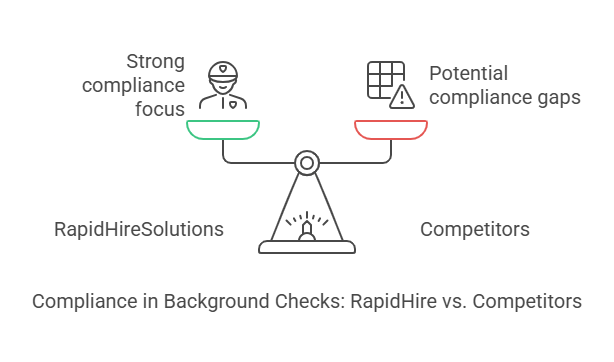
When conducting continuous background checks, compliance with legal regulations is paramount. Failure to adhere to the Fair Credit Reporting Act (FCRA), Americans with Disabilities Act (ADA), and state-specific laws could expose a business to legal challenges, fines, or lawsuits. This is particularly critical as continuous monitoring touches on sensitive areas, including criminal records, financial history, and medical data.
RapidHireSolutions ensures full compliance with FCRA and ADA regulations. Their services are designed to handle sensitive information responsibly, and the company works closely with clients to ensure that all monitoring practices meet or exceed federal and state legal requirements. RapidHireSolutions’ compliance-focused approach ensures that employers can implement continuous background checks without fear of legal repercussions.
On the other hand, competitors may not have the same level of focus on compliance, particularly when it comes to complex, state-specific regulations. Without strict adherence to these laws, employers using competing providers may inadvertently expose themselves to compliance violations.
Data Table: Compliance with Legal Regulations
| Provider | Compliance with FCRA & ADA | Compliance Advantage |
|---|---|---|
| RapidHireSolutions | Fully Compliant | ✅ High level of compliance |
| Competitor | Inconsistent Compliance | ❌ Risk of non-compliance |
Comprehensive Monitoring: A Holistic Approach to Employee Risk Management
Continuous background checks should offer a comprehensive range of monitoring services that go beyond criminal records. The ability to track financial health, driving records, drug and alcohol issues, and other potential red flags ensures that employers have a full picture of an employee’s behavior over time. For businesses in high-risk industries, such as healthcare, finance, or transportation, this level of monitoring is essential.
RapidHireSolutions offers comprehensive monitoring that covers:
- Criminal History: Regular checks for any new criminal activity, ensuring that employees’ criminal records are up-to-date.
- Financial Monitoring: Continuous updates on credit reports, bankruptcies, and other financial issues that may affect an employee’s reliability and trustworthiness.
- Driving Records: Monitoring of any changes in an employee’s driving record, especially crucial for roles that involve driving company vehicles.
- Drug and Alcohol Testing: Monitoring for employees in safety-sensitive roles, where substance abuse could pose a significant risk.
In comparison, many competitors provide limited services, often focusing solely on criminal history. This narrow approach leaves significant gaps in risk management, potentially overlooking financial troubles, driving violations, or substance abuse issues, which can have a substantial impact on a business.
Data Table: Comprehensive Monitoring Services
| Provider | Comprehensive Monitoring Services | Monitoring Advantage |
|---|---|---|
| RapidHireSolutions | Criminal, Financial, Driving, Drug/Alcohol | ✅ Full-spectrum monitoring |
| Competitor | Primarily Criminal History | ❌ Limited to criminal checks |
Customer Support: Availability and Quality
The effectiveness of a background check service is not just dependent on the results it provides but also on the level of customer support that comes with it. Employers need a provider who can assist them with interpreting results, navigating legal requirements, and ensuring smooth implementation.
RapidHireSolutions offers 24/7 customer support and dedicated account managers who are available to help clients with any queries related to background checks and continuous monitoring. The company prides itself on its high level of customer care, ensuring that businesses are never left in the dark when it comes to managing employee risks. The support team is well-versed in all aspects of background checks and can provide tailored assistance based on the specific needs of a business.
Competitors, however, may not offer the same level of customer service. While they might provide basic support during regular business hours, their customer service offerings can be limited, with slower response times and less personalized care. This lack of support can lead to frustration for businesses when they encounter issues or require assistance in understanding the results of background checks.
Data Table: Customer Support Comparison
| Provider | Customer Support | Support Advantage |
|---|---|---|
| RapidHireSolutions | 24/7 support, dedicated account managers | ✅ Exceptional, always available |
| Competitor | Limited to business hours | ❌ Less responsive |
Pricing Structure: Finding the Right Balance
Pricing plays a crucial role in the decision-making process when selecting a continuous background check provider. While cost should not be the sole factor, businesses need a provider that offers value for money while delivering reliable and comprehensive services.
RapidHireSolutions offers competitive pricing with flexible options that cater to businesses of all sizes. Whether you need a few background checks per month or frequent, ongoing monitoring for a large workforce, RapidHireSolutions provides scalable packages that offer excellent value. Their transparent pricing structure means businesses know exactly what to expect without hidden fees.
In contrast, competitors may charge higher fees for less comprehensive services. For businesses that require ongoing background checks, the total cost can quickly escalate. Some competitors may also have hidden charges for updates, reports, or special services, which can catch businesses off guard.
Data Table: Pricing Comparison
| Provider | Pricing Structure | Pricing Advantage |
|---|---|---|
| RapidHireSolutions | Transparent, scalable pricing | ✅ Cost-effective for all business sizes |
| Competitor | Higher fees, hidden charges | ❌ Higher overall costs |
Let’s Dive into a Proper Analysis
Now that we’ve covered the key points in the comparison, let’s analyze the strengths and weaknesses of RapidHireSolutions and its competitors in more detail.
Strengths of RapidHireSolutions:
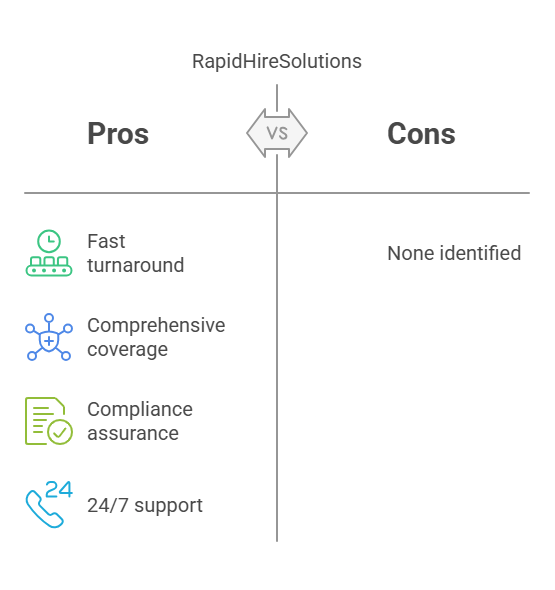
- Fast Turnaround Times: With an industry-leading 1-day service or 24-hour updates, RapidHireSolutions provides businesses with the fastest response time in the industry, ensuring that employers can act quickly on new information.
- Comprehensive Coverage: From criminal background checks to driving records, financial health, and substance abuse monitoring, RapidHireSolutions offers a full-spectrum service that covers all potential employee risks.
- Compliance Assurance: Staying compliant with FCRA, ADA, and other legal requirements is a top priority for RapidHireSolutions, minimizing the risk of noncompliance issues for businesses.
- 24/7 Customer Support: Businesses benefit from round-the-clock access to expert support, ensuring that they have the assistance they need whenever an issue arises.
Weaknesses of Competitors:
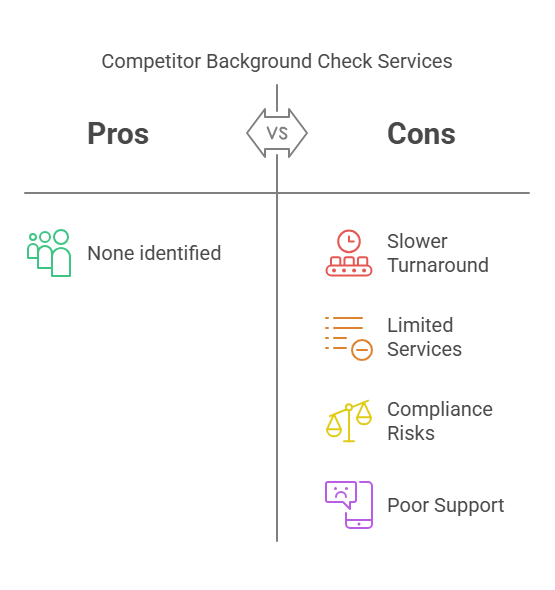
- Slower Turnaround Times: Many competitors take 15-20 days or more to provide updates, leaving businesses vulnerable to missed risks.
- Limited Service Offering: Competitors often focus primarily on criminal background checks, leaving other risks, like financial problems or driving infractions, unmonitored.
- Compliance Risks: Some competitors do not offer full legal compliance, putting businesses at risk of violating laws like FCRA or ADA.
- Inadequate Customer Support: Competitors may not provide the same level of dedicated, personalized support, leaving businesses without the help they need during critical moments.
By carefully considering these strengths and weaknesses, it becomes clear that RapidHireSolutions offers a more comprehensive, timely, and compliant solution for continuous background checks, making it the preferred choice for businesses looking to minimize risks and stay ahead of potential employee issues.
Legal Considerations, FAQs, and Conclusion
As businesses implement continuous background checks, it’s essential to understand the legal requirements and compliance aspects associated with these practices. Failing to adhere to the regulations could expose employers to legal consequences, ranging from fines to lawsuits. In this section, we will cover the legal considerations surrounding continuous background checks, address common frequently asked questions (FAQs), and conclude by summarizing why continuous background checks are essential for ongoing employee risk management.
Legal Considerations for Continuous Background Checks
Continuous background checks involve the monitoring of an employee’s records over time to identify potential red flags. Since continuous monitoring frequently touches on sensitive information, such as criminal records, financial status, or drug and alcohol testing, businesses must comply with several federal regulations and state-specific laws. The most significant regulations that employers must be aware of include:
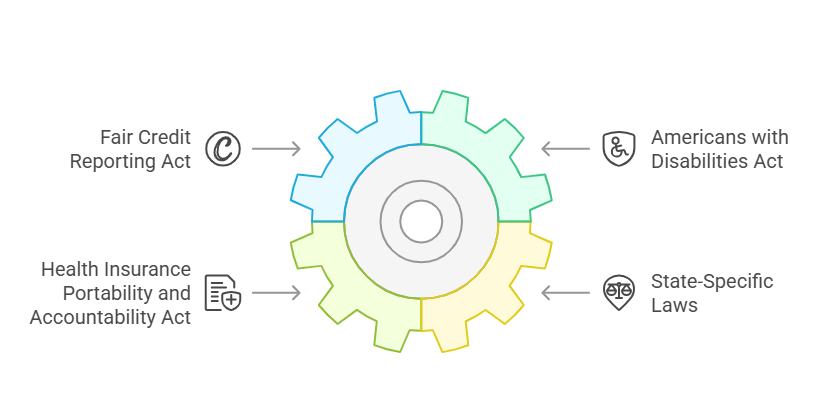
1. Fair Credit Reporting Act (FCRA)
The FCRA governs the use of background checks in employment decisions. Employers must obtain the employee’s written consent before conducting any background checks. Furthermore, if a company decides not to hire or take an adverse action based on the results of the background check, they must provide the individual with a notice that includes a copy of the report and the right to dispute any inaccuracies.
For continuous background checks, the FCRA requires that businesses obtain ongoing consent to monitor employees regularly. Employers should ensure that their monitoring practices align with FCRA requirements to avoid any potential legal issues.
2. Americans with Disabilities Act (ADA)
The ADA prohibits discrimination against employees with disabilities, and it governs how medical information is used in employment decisions. The ADA restricts employers from using certain types of health-related information, such as disability status, unless it is directly relevant to the job.
When conducting continuous background checks, companies must ensure they are not violating the ADA by improperly using health-related information, such as drug test results or medical conditions. Employers should be cautious about the types of information they monitor and how it is used in hiring and employment decisions.
3. Health Insurance Portability and Accountability Act (HIPAA)
HIPAA governs the privacy of an employee’s health information. Employers need to be mindful when conducting health-related background checks, such as drug testing or medical records reviews, as these activities can trigger HIPAA protections. Employers must handle medical information carefully to avoid violating privacy rights.
When continuous monitoring includes medical information or drug testing, companies must ensure that they comply with HIPAA regulations to prevent mishandling of sensitive health data.
4. State-Specific Laws
In addition to federal regulations, many states have specific laws that govern the use of background checks in the hiring process. These laws may vary from state to state, particularly concerning how employers can use criminal records, arrest data, or drug test results. California, for example, has stricter laws regarding the use of criminal records, while New York and Washington have specific restrictions around the use of credit reports in employment decisions.
Employers must stay informed about the state-specific regulations in their jurisdictions to avoid violating local laws.
Frequently Asked Questions (FAQs)
How often should continuous background checks be conducted?
The frequency of continuous background checks depends on the nature of the industry and the specific role an employee holds. For example, high-risk industries such as healthcare, transportation, and finance may require more frequent monitoring to identify potential risks. Employers generally review background check results at least once a year, but continuous monitoring can be set up to flag updates or red flags as they occur.
Are continuous background checks required by law?
While continuous background checks are not universally required by law, many employers use them as a best practice to ensure they stay ahead of potential employee risks. For example, certain industries may have regulatory requirements that necessitate ongoing monitoring, especially for employees in positions of trust or safety-sensitive roles. Additionally, organizations may choose continuous background checks as a proactive approach to employee risk management.
What types of incidents are typically flagged during continuous background checks?
During continuous background checks, the types of incidents that can be flagged include:
- Criminal Activity: Any new criminal charges, arrests, or convictions.
- Financial Issues: Changes in credit scores, bankruptcy filings, or collection activities.
- Driving Violations: Updates to an employee’s driving record, such as DUIs or accidents.
- Substance Abuse: Positive drug or alcohol tests, especially for employees in safety-sensitive roles.
By flagging these issues in real-time, businesses can address potential risks before they escalate, ensuring a safer and more compliant workplace.
Can employees opt out of continuous background checks?
Employees must provide consent for background checks to be conducted in the first place, but once an employee has given consent, opting out of continuous monitoring is generally not an option. However, employees can request access to the information that is being monitored, and employers must provide this access when required by law. It's also essential for employers to keep employees informed about the types of background checks that will be conducted and how often.
Do continuous background checks affect employee privacy?
While continuous background checks may raise concerns about employee privacy, employers are required to ensure they are compliant with relevant laws, including the FCRA, ADA, and HIPAA. Employers must notify employees about the types of checks being conducted and obtain their consent. Transparency and adherence to privacy regulations are key to minimizing privacy concerns and maintaining trust with employees.
Conclusion
In today’s fast-paced business world, continuous background checks are no longer optional but a necessity for effective employee risk management. Employers must ensure that their employees remain compliant with company policies and laws, while also protecting the business from potential risks like criminal activity, financial troubles, or unsafe behaviors.
By investing in continuous background checks, companies can minimize the risk of workplace accidents, maintain a safer working environment, and ensure that they remain compliant with state and federal regulations. RapidHireSolutions offers a comprehensive suite of background check services, including continuous monitoring, to help businesses stay ahead of potential risks and maintain a secure, compliant workforce.
Through timely updates, full-spectrum monitoring, and legal compliance, RapidHireSolutions empowers businesses to proactively manage employee risk and make informed decisions that support long-term success.

